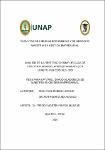| dc.contributor.advisor | Pinedo Manzur, Freddy Martín | |
| dc.contributor.author | Pinedo Lozano, Jean Paul | |
| dc.contributor.author | Rodríguez Angulo, Delfor | |
| dc.date.accessioned | 2019-04-24T18:06:44Z | |
| dc.date.available | 2019-04-24T18:06:44Z | |
| dc.date.issued | 2019 | |
| dc.identifier.uri | http://repositorio.unapiquitos.edu.pe/handle/20.500.12737/6064 | |
| dc.description.abstract | De todos los beneficios tributarios que existen en el Perú como fomento a las exportaciones, es sin lugar a dudas, la Restitución Simplificada de Derechos Arancelarios (Drawback), la que más adeptos tiene. Incluso siempre se ha sostenido que no existe aquel beneficiario que no se sienta completamente atraído por las ventajas competitivas que el Drawback ofrece de manera directa en la actualidad. Sin duda hay mucho por compartir respecto al Drawback, pero se debe empezar señalando que el Régimen Aduanero del Drawback ha sido recogido en los artículos 82° y 83° la nueva Ley General de Aduanas aprobado por el Decreto Legislativo N° 1053 estableciendo las mismas definiciones, requisitos y procedimientos previstos desde mediados de los años noventa; de modo que en las siguientes líneas se desarrollan algunos aspectos que deberían tomarse en cuenta para la adecuada aplicación del Procedimiento de Restitución Simplificado de Derechos Arancelarios
Sin embargo, las empresas exportadoras de Loreto vienen haciendo poco uso de este beneficio debido a varios factores. Uno de ellos es el desconocimiento del beneficio, otro es el temor a la fiscalización que realiza SUNAT – ADUANAS para poder otorgar el beneficio, entre los más importantes. A pesar de esto, la herramienta sigue siendo una de las de mayor uso a nivel nacional, que el gobierno comienza a bajar gradualmente, situación de la que se ocupa la presente tesis.
La estructura de esta investigación se detalla en el Índice, mostrando total coherencia entre un capítulo y otro con la finalidad de demostrar la Hipótesis General planteada, así como las Hipótesis Específicas.
La investigación analiza la Restitución Simplificada de Derechos Arancelarios - Drawback, recogiendo información de las empresas de Loreto que la utilizan. Luego, se estudian los datos y se validan las hipótesis para, posteriormente, arribar a las Conclusiones y Recomendaciones, en los respectivos capítulos que conforman la presente investigación.
Por último, se validan las hipótesis de manera analítica y gráfica, para posteriormente arribar a las conclusiones y recomendaciones del estudio. | es_PE |
| dc.description.abstract | Of all tax benefits that exist in Peru Export Promotion as it is without doubt, the Simplified Restitution of Customs Duties (Drawback), where more followers you have. Include always has maintained that there is one recipient not feel completely attracted advantages disadvantage offers competitive than directly today. There is certainly much to share respect to Drawback, but must start by pointing out that the Customs Regime Drawback has been included in Articles 82 ° and 83 ° the new General Customs Law approved by Legislative Decree No. 1053 establishing same definitions, requirements and expected from the mid-nineties procedures; that mode in the following lines some aspects that should be considered for the proper application of Restitution Simplified procedure developed Customs Duties.
However, exporting companies are doing little use Loreto of this benefit because a several factors. One is the lack of benefit, the other is the fear of the audit Performing SUNAT - CUSTOMS to can give the benefit, among the most important. Despite this, the tool remains one of the most use of national level, that the Government starts a gradually lower, situation which this thesis deals.
The structure of this research is detailed in the Index, total consistency between a Chapter showing and other in order to demonstrate the general hypothesis, and the specific assumptions.
Research analyzes the Restitution Simplified Customs Duties - Drawback, collecting information of Loreto companies that use it. Then, we study the data and assumptions are validated to then arrive at the conclusions and recommendations in the respective chapters of the present investigation.
Finally, the hypothesis of analytical and graphical way, later to arrive at the conclusions and recommendations of the study are validated. | en_US |
| dc.description.uri | Tesis | es_PE |
| dc.format | application/pdf | es_PE |
| dc.language.iso | spa | es_PE |
| dc.publisher | Universidad Nacional de la Amazonía Peruana | es_PE |
| dc.rights | info:eu-repo/semantics/openAccess | es_PE |
| dc.rights | Attribution-NonCommercial-NoDerivs 3.0 United States | * |
| dc.rights.uri | http://creativecommons.org/licenses/by-nc-nd/3.0/us/ | * |
| dc.source | Universidad Nacional de la Amazonía Peruana | es_PE |
| dc.source | Repositorio institucional - UNAP | es_PE |
| dc.subject | Beneficios arancelarios | es_PE |
| dc.subject | Drawback | es_PE |
| dc.subject | Política arancelaria | es_PE |
| dc.title | Análisis de la restitución simplificada de derechos arancelarios (Drawback) en Loreto, período 2010-2014 | es_PE |
| dc.type | info:eu-repo/semantics/masterThesis | es_PE |
| thesis.degree.discipline | Ciencias Económicas y de Negocios | es_PE |
| thesis.degree.grantor | Universidad Nacional de la Amazonía Peruana. Facultad de Ciencias Económicas y de Negocios | es_PE |
| thesis.degree.level | Maestría | es_PE |
| thesis.degree.name | Magister en Gestión Empresarial | es_PE |
| thesis.degree.program | Regular | es_PE |
| dc.subject.ocde | http://purl.org/pe-repo/ocde/ford#5.02.04 | es_PE |


